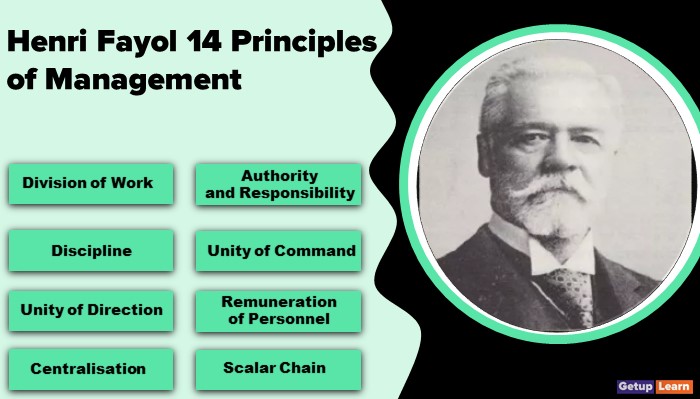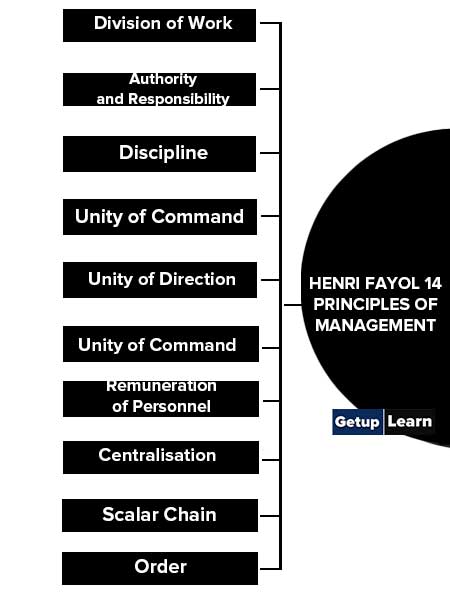
Table of Contents
-
1 Henri Fayol 14 Principles of Management
- 1.1 Division of Work
- 1.2 Authority and Responsibility
- 1.3 Discipline
- 1.4 Unity of Command
- 1.5 Unity of Direction
- 1.6 Subordination of Individual to General Interest
- 1.7 Remuneration of Personnel
- 1.8 Centralisation
- 1.9 Scalar Chain
- 1.10 Order
- 1.11 Equity
- 1.12 Stability of Tenure
- 1.13 Initiative
- 1.14 Espirit De Corps
- 2 Criticism of Henri Fayol 14 Principles of Management
- 3 Difference Between Contribution of Taylor and Fayol
- 4 FAQ Related to Henri Fayol 14 Principles of Management
Henri Fayol 14 Principles of Management
These are the following Henri Fayol 14 principles of management explained below:
- Division of Work
- Authority and Responsibility
- Discipline
- Unity of Command
- Unity of Direction
- Subordination of Individual to General Interest
- Remuneration of Personnel
- Centralisation
- Scalar Chain
- Order
- Equity
- Stability of Tenure
- Initiative
- Espirit De Corps

Division of Work
The object of the division of work is to produce more and better work with the same effort. It is accomplished through a reduction in the number of tasks to which attention and effort must be directed.
Authority is defined as ‘the right to command and the power to make oneself obeyed’. Responsibility coexists with authority and is its other side. Fayol made a distinction between official authority and personal authority, the latter stemming from the manager’s own intelligence, integrity, experience, personality, knowledge and skills.
Discipline
It implies respect for agreements designed to secure obedience. It must prevail throughout an organization to ensure its smooth functioning. Discipline requires clear and fair agreements, good supervision and judicious application of penalties.
Unity of Command
Every employee should receive orders and instruction from only one superior and a subordinate should be accountable to only one superior.
Unity of Direction
Each group of activities having one objective should be unified by having one plan and one head.
Subordination of Individual to General Interest
Subordination of Individual to General Interest: The interest of any one employee or group of employees should not take precedence over the interests of the organization as a whole.
Remuneration of Personnel
The amount of remuneration and the methods of payment should be just and fair and should provide the maximum possible satisfaction to both employees and employers.
Centralisation
It refers to the degree to which subordinates are involved in decision-making. Whether decision-making is centralized (to management) or decentralized (to subordinates) is a question of proper proportion. The task is to find the optimum degree of centralization for each situation.
Scalar Chain
The scalar chain is the chain of superiors ranging from the ultimate authority to the lowest ranks. Communication should follow this chain. However, if following the chain creates delays, cross-communications can be followed if agreed to by all parties and superiors are kept informed.
Order
It is a rational arrangement for things and people. Fayol emphasized both material order and human order. In material order, there should be a place for everything and everything should be in its proper place. In human order, there should be an appointed place for everyone and everyone should be in his or her appointed place.
Equity
Managers should be kind and fair to their subordinates. The application of equity requires a good sense, experience and a humanistic attitude for soliciting loyalty and devotion from subordinates.
Stability of Tenure
High employee turnover is inefficient. Management should provide orderly personnel planning and ensure that replacements are available to fill vacancies.
Initiative
Subordinates should be provided with an opportunity to show their initiative as a way to increase their skills and inculcate a sense of participation.
Espirit De Corps
Union is strength, and it comes from the harmony and mutual understanding of the personnel. Management should not follow the policy of ‘divide and rule’. Rather it should strive to maintain team spirit and cooperation among employees so that they can work together as a team for the accomplishment of common objectives.
Criticism of Henri Fayol 14 Principles of Management
These are the criticism of Henri Fayol 14 principles of management:
- His theory is said to be too formal. There is no single classification of managerial functions acceptable to all functional theorists. There is also a lack of unanimity about the various terms such as management, administration etc.
- He did not pay adequate attention to workers.
- The fundamentalists considered their principles to be universal in nature. But many of the principles have failed to deliver the desired results in certain situations.
- There is a vagueness and superficiality about some of his terms and definition.
Difference Between Contribution of Taylor and Fayol
These are the points of difference between contribution of Taylor and Fayol:
| Basis of Comparison | Taylor | Fayol |
| Perspective | Shop floor level or the job of a supervisor. | Top Management |
| Focus | Improving productivity through work simplification and standardization. | Improving overall administration through general principles. |
| Personality | Scientists | Practitioner |
| Results | Scientific observation and measurement. | Universal Truths developed from personal experiences. |
| Major Contribution | Science of Industrial Management. | A systematic theory of management |
What are the Henri Fayol 14 principles of management?
The following are the Henri fayol 14 principles of management:
1. Division of Work
2. Authority and Responsibility
3. Discipline
4. Unity of Command
5. Unity of Direction
6. Subordination of Individual to General Interest
7. Remuneration of Personnel
8. Centralisation
9. Scalar Chain
10. Order
11. Equity
12. Stability of Tenure
13. Initiative
14. Espirit De Corps.















